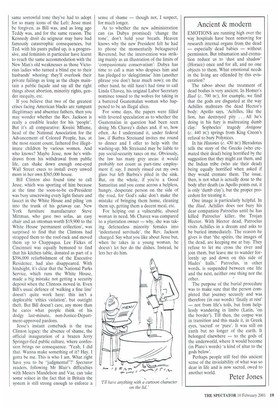Ancient & modern
EMOTIONS are running high over the way hospitals have been removing for research internal organs from the dead — especially dead babies — without permission. But inhumation and cremation reduce us to 'dust and shadow' (Horace) once and for all, and no one objects to them. What emotional needs in the living are offended by this evisceration?
The taboo about the treatment of dead bodies is very ancient. In Homer's Iliad (c. 700 Bc), for example, we find that the gods are disgusted at the way Achilles maltreats the dead Hector's body: Apollo says, 'Achilles, like the lion, has destroyed pity . . All he's doing in his fury is maltreating dumb clay.' Sophocles' tragedy Antigone (c. 440 BO springs from King Creon's refusal to bury Polynices.
In his Histories (c. 430 BO Herodotus tells the story of the Greeks (who cre mated their dead) being horrified by the suggestion that they might eat them, and the Indian tribe (who ate their dead) being equally horrified when asked if they would cremate them. The issue, then, is not what is actually done to the body after death (as Apollo points out, it is only 'dumb clay'), but the proper procedure for treating it.
One image is particularly helpful. In the Iliad, Achilles does not bury his dear companion Patroclus until he has killed Patroclus' killer, the Trojan Hector. With Hector dead, Patroclus visits Achilles in a dream and asks to be buried immediately. The reason he gives is that 'the spirits, the images of the dead, are keeping me at bay. They refuse to let me cross the river and join them, but leave me to wander for lornly up and down on this side of Hades' halls.' Patroclus, in other words, is suspended between one life and the next, neither one thing nor the other.
The purpose of the burial procedure was to make sure that the person com pleted that journey securely and was therefore (in our words) 'finally at rest' — not from life's toils, but from help lessly wandering in limbo (Latin, 'on the border'). Till then, the corpse was in transition and this made it, in Greek eyes, 'sacred' or 'pure'. It was still on earth but no longer of the earth. It belonged elsewhere — to the gods of the underworld, where it would become (in Plato's words) 'a kind of altar to the gods below'.
Perhaps people still feel this ancient sense of the inviolability of what was so dear in life and is now sacred, owed to
another world. Peter Jones


































































 Previous page
Previous page